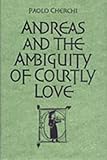Andreas and the Ambiguity of Courtly Love / Paolo Cherchi.
Material type: TextSeries: Toronto Italian StudiesPublisher: Toronto : University of Toronto Press, [1994]Copyright date: ©1994Description: 1 online resource (194 p.)Content type:
TextSeries: Toronto Italian StudiesPublisher: Toronto : University of Toronto Press, [1994]Copyright date: ©1994Description: 1 online resource (194 p.)Content type: - 9780802005779
- 9781442670839
- 849/.1209354 22
- PC3308 .C48 1994
- online - DeGruyter
| Item type | Current library | Call number | URL | Status | Notes | Barcode | |
|---|---|---|---|---|---|---|---|
 eBook
eBook
|
Biblioteca "Angelicum" Pont. Univ. S.Tommaso d'Aquino Nuvola online | online - DeGruyter (Browse shelf(Opens below)) | Online access | Not for loan (Accesso limitato) | Accesso per gli utenti autorizzati / Access for authorized users | (dgr)9781442670839 |
Browsing Biblioteca "Angelicum" Pont. Univ. S.Tommaso d'Aquino shelves, Shelving location: Nuvola online Close shelf browser (Hides shelf browser)

|

|

|

|

|

|

|
||
| online - DeGruyter An Irish Working Class : Explorations in Political Economy and Hegemony, 1800-1950 / | online - DeGruyter An Italian Renaissance Sextet : Six Tales in Historical Context / | online - DeGruyter Analytical Political Philosophy : From Discourse, Edification / | online - DeGruyter Andreas and the Ambiguity of Courtly Love / | online - DeGruyter Andrés González de Barcia and the Creation of the Colonial Spanish American Library / | online - DeGruyter Angelic Echoes : Hervé Guibert and Company / | online - DeGruyter Anglo-Saxon England in Icelandic Medieval Texts / |
restricted access online access with authorization star
http://purl.org/coar/access_right/c_16ec
A resolution to the vexed problem whether a troubadour's love is erotic or spiritual is offered by Paolo Cherchi through a new reading of Andreas Capellanus' De Amore (written around 1186-1196). He suggests that Andreas, using a rhetorical strategy that creates ambiguity, condemns courtly love because its claim that passion generates virtue is untenable and deceitful. Although Andreas grasped the core of the courtly love 'system,' namely, the relation between passion and ethics, he failed to consider the notion of mezura, that courtly virtue through which troubadours transformed nature into culture, and erotic passion into social discourse.Cherchi offers an innovative interpretation and a close reading of selected poems. He traces the history of Provençal lyric poetry, highlighting some of the significant personalities and movements.
Mode of access: Internet via World Wide Web.
In English.
Description based on online resource; title from PDF title page (publisher's Web site, viewed 01. Nov 2023)


